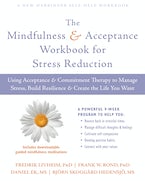By Fredrik Livheim, PhD, Frank W. Bond, PhD, Daniel Ek, MS, Björn Skoggård Hedensjö, MS, coauthors of The Mindfulness and Acceptance Workbook for Stress Reduction
Life is full of everyday uncertainties. From wider questions like What will my life look like a year from now? to What challenges lurk around the corner? to inevitable and difficult life circumstances: the death of a loved one, a family crisis, or serious health issues. All of us have faced and will face tremendous stress at some point in our lives.
Current events are adding stress to our already full plates. According to a Human Development Reportissued by the United Nations titled “Uncertain Times, Unsettled Lives: Shaping our Future in a Transforming World,” we are now collectively facing what they call “a new uncertainty complex.” So, as if the everyday uncertainties listed above weren’t enough, we now have to worry about existential threats (climate crises, pandemics, use of nuclear weapons) and the pursuit of sweeping societal transformations (knowing that we need to fundamentally change how we live in a warming world, but not knowing how this will happen or what it will mean for our daily lives). If just reading the previous sentence causes you stress, you are not alone.
We know that all humans experience stress in response to new, unpredictable, and uncertain events. As you have likely experienced, this new uncertainty complex of global events interacts with our respective personal difficulties to create a perfect storm of stress. Additionally, a common response to stress is to feel overwhelmed by complexity, which causes one to look for simple truths and to see the world in black-and-white, all-or-nothing terms. You can imagine how this in turn fuels the uncertainty complex and risks escalation of stress-inducing situations: from personal to global conflicts.
Acceptance and Commitment Therapy Offers Evidence-Based Relief
In my view, we all need effective tools to deal with stress and uncertainty to help us make wise choices—as family and community members, as colleagues, and as stewards of our beautiful blue planet earth, our mutual spaceship in a vast, cold space. Acceptance and commitment therapy (ACT) has much to offer every one of us.
More than twenty years ago, my colleagues and I completed one of the first studies to test how ACT can help people deal with stress and build resilience in group therapy. A dozen high-quality studies now say that ACT works well in group format. To make this knowledge more available, we wrote the The Mindfulness and Acceptance Workbook for Stress Reduction in 2018, and we spent the last three years in collaboration with independent researchers at the medical university Karolinska Institutet in Sweden doing a randomized, controlled trial to test the book’s efficacy without the help of a therapist.
Here are the conditions of the study:
- 518 people tested their stress levels themselves via the internet.
- 133 participants with some stress were randomized to read the self-help book (sixty-seven participants) or to be on a waiting list (sixty-six participants).
- Those who read the book did so without therapist contact.
And here is what we found. Compared to the waiting list, those who read the book experienced:
- Less stress with large effect sizes
- Less anxiety, depression, and fatigue symptoms with medium effect sizes.
Most importantly, the effects persisted through long-term follow-up six months later.
About the Book
Some of the strategies in our book are straightforward, and may even sound like common sense (although all are grounded in science). What we do, however, is teach you a step-by-step approach to apply these strategies in your daily life. If you have tried to adopt any of the following strategies but not yet succeeded at making them stick, you may be interested in our now clinically proven, The Mindfulness and Acceptance Workbook for Stress Reduction.
The first step to successfully managing stress is to recognize its early signs. It should be as if a phone alarm in your mind goes off every time you encounter a difficult situation and your body responds accordingly. When you notice that alarm, remember two things:
- We all go through crises and difficult periods at some points in life. But such times pass, no matter how bleak things might seem in the moment.
- There are effective strategies you can use to counteract the harmful effects of long-term stress.
The top six strategies that we advise and teach in our book are:
- Acceptance. Just living your life will naturally bring stress. Acknowledge the presence of natural stress. See if you can be willing to have the emotions that rise up inside you when this stress appears. Stop to take note of what’s going on and how you feel in response. Do your best to open to your emotional reaction instead of fighting it. See if you can tap into your curiosity about what is going on.
- Solve. A lot of the time there is something we can do about what is stressing us out. Sit down, brainstorm solutions, and try them out.
- Recovery. The biggest dangers of stress occur when long-term stressors persist without recovery. So, when you are feeling stressed, it’s extra important to do activities that restore your sense of peace and well-being. And remember, sleep is one of the most important sources of recovery.
- Exercise. Physical exercise is so, so effective for dealing with stress, anxiety, and depression. If you already are exercising regularly, don’t stop. If you are not, try to schedule two (or more) pulse-raising exercise sessions (at minimum a brisk thirty-minute walk) a week.
- Relationships. We humans are a flock species. Do what you can to take care of and seek nourishment in the relationships you already have. If you don’t mind crowds, you might also try attending an event with lots of people (sports or social gatherings) to experience a general sense of togetherness.
- Mindfulness. Schedule mindfulness exercises. You can access free mindfulness exercises on the website for your book, and there are plenty of free (or paid) apps to choose from.
However you choose to deal with stress, know that you are not alone in experiencing it—now more than ever.
References:
If you want to read the scientific article, it is available for free via this link: https://doi.org/10.1016/j.jcbs.2023.01.003
Fredrik Livheim, PhD, is a licensed clinical psychologist in the department of clinical neuroscience at the Karolinska Institutet in Stockholm, Sweden. He has trained more than 1,500 professionals in how to use acceptance and commitment therapy (ACT) in a group format to improve employees’ mental health. His research focuses on the use of ACT to reduce stress and help people thrive.
Frank W. Bond, PhD, is professor of psychology and management at Goldsmiths, University of London; where he is also director of the Institute of Management Studies. He has published widely in the areas of ACT and organizational behavior, and the processes that underpin peak performance and well-being in the workplace. He is currently using this interdisciplinary research to help the European Space Agency’s manned mission to Mars in the next decade.
Daniel Ek, MS, is a licensed clinical psychologist and mindfulness teacher, with professional experience in stress management. Ek treats patients with stress and chronic fatigue syndrome (CFS) on a daily basis, and trains professionals in how to use ACT in a group format to improve employees’ mental health.
Björn Skoggård Hedensjö, MS, is a science reporter and clinical psychologist.



 2024 Peace Playbook: 3 Tactics to Avoid Clashes with Your Partner
2024 Peace Playbook: 3 Tactics to Avoid Clashes with Your Partner